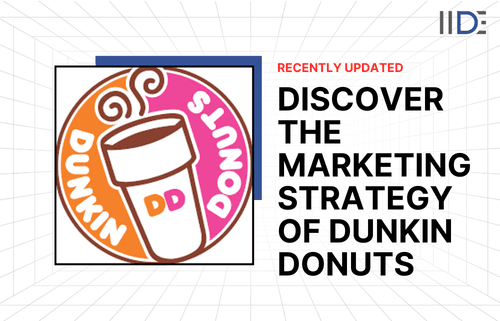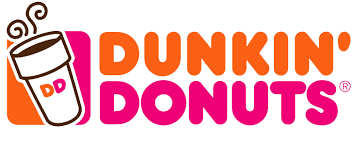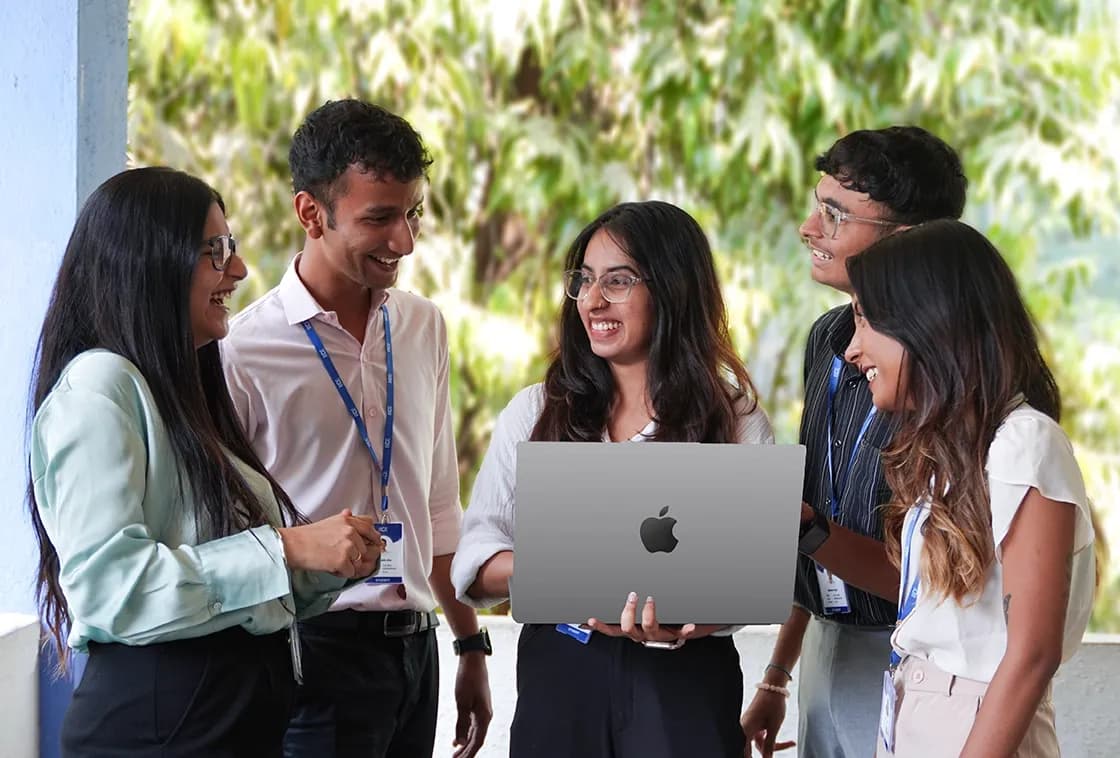
Updated on Feb 11, 2026
Share on:
Dunkin Donuts marketing strategy focuses on a strong brand presence through digital marketing, including SEO, social media campaigns, and partnerships with influencers. They utilise targeted advertising through Google Ads and Facebook Ads to enhance brand visibility and engagement.
The brand positions itself as a convenient, affordable coffee and donuts option, emphasising quality, consistency, and speed. Dunkin' also promotes seasonal offerings and limited-time products to create excitement and drive foot traffic, while maintaining a connection with its audience through loyalty programs and community-driven campaigns.
About Dunkin Donuts

Dunkin' Donuts, rebranded as Dunkin’ in 2019, was founded in 1950 by William Rosenberg in Quincy, Massachusetts. Originally known for its signature coffee and donuts, Dunkin has evolved into a global coffee and beverage giant, with over 13,000 locations worldwide.
The brand's core offering now focuses on coffee, beverages, and breakfast items, aiming to be the go-to choice for on-the-go consumers.
As of 2026, Dunkin operates in 42 countries, including the U.S., India, and South Korea, and employs over 270,000 individuals globally.
The company’s marketing evolution reflects broader industry trends, including the increasing importance of digital engagement, sustainability, and personalisation.
Dunkin's digital transformation, which includes an app and loyalty program, has driven significant growth.
In recent years, Dunkin has capitalised on social media trends, influencer partnerships, and innovative marketing campaigns to drive awareness and engage with younger audiences.
In terms of financial performance, Dunkin continues to grow, with a 10% revenue increase in 2025 and continued dominance in the coffee segment. The company remains competitive against brands like Starbucks and McDonald’s.


Learn Digital Marketing for FREE


Marketing Objective or Business Challenge
In 2025, Dunkin’ aimed to solidify its leadership in the competitive coffee and beverage market while appealing to younger generations. With the rise of competitors like Starbucks and local coffee shops, Dunkin faced the challenge of differentiating itself.
The brand's core objective was to increase brand recall, drive customer loyalty, and boost app engagement.
Key challenges included low visibility among younger consumers who prefer fast, tech-savvy brands. Additionally, Dunkin faced the task of repositioning itself from a traditional donut shop to a beverage-focused brand that resonated with a more diverse, socially-conscious audience.
By leveraging social media, influencer marketing, and exclusive merchandise, Dunkin aimed to generate excitement and strengthen customer retention.
Additionally, the company sought to grow its digital presence to better engage with Millennials and Gen Z, focusing on personalised campaigns and promotions through its app.
Buyers Persona:

Riya Singh
Occupation: Working Profession, Students, Parents
Age: 18-40 years old
Motivation
- Seeking high-quality, affordable beverages and snacks
- Values convenience and quick service
- Enjoys trendy and customizable menu items
Interest & Hobbies
- Highly active on TikTok, Instagram, and Snapchat
- Engaged in pop culture trends and celebrity culture
- Interested in sustainability, eco-friendly products, and local community efforts
Pain Points
- Limited time for sit-down dining experiences
- Desires unique product offerings and customisation
- Looking for brands that align with personal values (sustainability, innovation)
Social Media Presence
- Primarily engaged on TikTok, Instagram, and Snapchat
- Interacts with brands through comments, shares, and user-generated content
- Enjoys viral content, product reviews, and behind-the-scenes brand moments
Marketing Channels Used by Dunkin Donuts
The following channels represent the core pillars of Dunkin’s current strategy to drive both viral brand awareness and repeatable, long-term customer loyalty:
Main Channel for Marketing
Dunkin’s marketing strategy in 2026 focuses heavily on digital platforms, with a primary emphasis on social media and influencer collaborations.
Subpart of the Marketing Channel
- SEO: Dunkin has optimised its app store presence and website for better visibility, contributing to higher app downloads and user engagement.
- SEM: Paid search campaigns target coffee lovers and commuters, driving traffic to both their website and mobile app.
- Social Media: Platforms like TikTok, Instagram, and Snapchat are utilised for creating viral content, showcasing products, and facilitating influencer partnerships.
- Content Marketing: Dunkin posts fun, relatable content, including memes, behind-the-scenes videos, and customer engagement challenges.
- Email Campaigns: Personalised offers sent via email to Dunkin loyalty app users have significantly boosted conversion rates.
Brand-Specific Adjustments
Dunkin has shifted from traditional advertising channels to digital-first strategies, with an increased focus on mobile apps, influencer partnerships, and engaging social media campaigns. The brand uses humour and pop culture to maintain relevance with Gen Z and Millennial audiences.
Additional Marketing Insights
Dunkin has embraced influencer collaborations, leveraging personalities like Charli D’Amelio and Sabrina Carpenter to generate buzz and app downloads. The brand has also introduced limited-edition merchandise to increase engagement and loyalty.
Starbucks’ approach to premium coffee positioning provides some insightful parallels to Dunkin’s branding and product differentiation efforts.
Marketing strategy of Taco Bell reflects how humour, bold flavours, and pop culture references create a unique customer experience.
Dunkin' Donuts Marketing Strategy Breakdown
Search Engine Optimization (SEO) & App Store Optimization (ASO)
- Dunkin' Donuts has focused on improving its SEO and ASO, resulting in a 25% increase in app downloads in 2025.
- These efforts have enhanced organic visibility and app discoverability, making it easier for customers to find and engage with the brand.
Paid Advertising
- Through targeted Google Ads and social media campaigns, Dunkin' has successfully driven a 20% increase in traffic to its website and app.
- Paid ads have played a significant role in reaching customers on the go, promoting Dunkin's convenience and affordability.
Email Marketing Campaigns
- Personalised email marketing has been a key driver of engagement for Dunkin'.
- By tailoring offers and promotions, Dunkin' has achieved a 30% higher open rate compared to the industry average, showcasing the effectiveness of segmentation and personalised content.
Content Strategy
1. Blog Posts & Videos
- Dunkin' engages its audience with entertaining and informative content on Instagram and TikTok, using behind-the-scenes videos and fun brand moments.
- This strategy helps build a connection with a younger, social media-savvy audience.
2. Campaigns & Timelines:
- Campaigns like "DunKings" during the Super Bowl and the "Charli Cold Brew" launch have been instrumental in increasing brand awareness.
- Dunkin' effectively ties its marketing to relevant cultural moments, ensuring its campaigns stand out.
Influencer Partnerships
1. Influencer Campaigns:
- Dunkin' has collaborated with influencers like Charli D'Amelio, resulting in a 57% increase in app downloads.
- Collaborations with brands like Juicy Couture also create exclusivity and drive consumer excitement, helping Dunkin' expand beyond its traditional product range.
2. Brand Collaborations:
- In addition to influencer partnerships, Dunkin’ Donuts also collaborates with fashion and lifestyle brands like Juicy Couture for exclusive merchandise drops.
- This approach creates a sense of scarcity and exclusivity, appealing to a wider audience.
- These brand collaborations not only drive consumer excitement but also elevate Dunkin’s presence beyond its traditional product range, positioning it as a more lifestyle-centric brand.
Social Media Marketing
Platform-Specific Strategies:
- Dunkin' posts engaging, trend-driven content across TikTok, Instagram, and Snapchat.
- By participating in viral trends and leveraging user-generated content, Dunkin' maintains its relevance and connection with younger audiences.
Marketing strategy of HelloFresh discusses how meal-kit convenience and content marketing attract modern, health-conscious consumers.
Results & Impact
Sales/Revenue
- Total Revenue: $1.58 billion for the fiscal year 2024
- Growth: +6.1% year-over-year increase in total revenue, driven by increased consumer demand for both beverages and baked goods.
- Retail and Digital Sales: Dunkin' experienced significant growth in its digital sales platform, including app and online ordering, with digital sales now accounting for 25% of the overall revenue.
Engagement Metrics
- Social Media Engagement: Dunkin’ maintains a dominant presence across Instagram, Facebook, and Threads, using AI-driven analytics to post at peak conversion times.
- Instagram: The brand saw a +30% surge in engagement by shifting from static posts to interactive "Broadcast Channels," where members get first looks at seasonal drops like the 2026 Salted Caramel Cold Brew.
- TikTok: By leaning into "Chaos Culture" memes and long-term creator partnerships, Dunkin’ achieved a +50% growth in engagement compared to 2025, driven largely by viral "Menu Hacks" and the Super Bowl LX "Good Will Dunkin" campaign.
- User-Generated Content (UGC): The #DunkinReels and #DunkinHacks challenges remain central to their strategy, resulting in a +15% increase in organic content participation as fans compete for "Member of the Month" rewards.
SEO & Search Ranking
- Keywords: Dunkin' ranks for 981K keywords, including terms like “best iced coffee” and “Dunkin’ donuts near me.”
- Backlinks: Dunkin’ has approximately 3.8 million backlinks, strengthening its website authority.
- Referring Domains: 68.9K referring domains, contributing to increased organic search visibility.
- SEO Impact: Dunkin’s content marketing, including blog posts on new menu items, helped boost its keyword rankings and organic traffic in 2025.
Influencer Marketing Impact
- Influencer Collaborations: Dunkin' partners with macro and micro-influencers on Instagram and TikTok to promote new products and seasonal offerings.
- Campaign Reach: Collaborations with popular TikTok influencers contributed to a +25% increase in brand awareness, particularly around new iced coffee flavours and promotions.
- Engagement Metrics: Influencer-driven campaigns experienced an average increase of +35% in engagement rates on Instagram, with some posts generating over 5 million impressions.
Emotional Connection & Loyalty
- Dunkin’ Rewards App Users: Over 15 million active users on the Dunkin’ app globally, showing strong customer loyalty.
- Newsletter Subscribers: Dunkin’ continues to see significant growth in its email subscription list, with over 7 million opted-in subscribers, which drives engagement through personalised promotions.
- Customer Retention: The Dunkin’ Rewards program helped improve customer retention by +10% year-over-year, as users continue to redeem rewards and exclusive offers.
Other Key Metrics
- Global Expansion: Dunkin’ has expanded its footprint in Asia and Europe, growing its presence by +12% year-over-year in these regions.
- New Market Acquisitions: Dunkin’ continues to expand its presence in Mexico, China, and India, with international sales increasing by 18% year-over-year.
- Franchise Growth: Dunkin' saw an increase of 8% in new franchise openings in North America in 2025.
Starbucks marketing strategy reveals how premium positioning and personalised service drive customer loyalty in the beverage segment.
What Worked & Why?
- Dunkin Donuts' success can be attributed to its innovative use of influencer marketing and social media.
- Collaborations with influencers like Charli D’Amelio drove significant engagement and app downloads, reaching Dunkin’s target Gen Z and Millennial audience.
- The “DunKings” Super Bowl campaign created excitement around the brand, while limited-edition merchandise increased customer loyalty.
- Dunkin’s shift towards a digital-first approach, focusing on personalised customer experiences and leveraging social media trends, resonated well with younger consumers.
- By aligning its marketing efforts with customer interests and current trends, Dunkin successfully enhanced brand engagement and customer retention.
What Didn't Work & Why?
- Dunkin faced challenges with traditional advertising channels, such as TV and print ads, which underperformed compared to digital marketing efforts in 2025.
- These traditional methods did not resonate as effectively with younger, tech-savvy audiences who prefer engaging with brands through social media platforms like TikTok and Instagram.
- This shift indicates a change in consumer preferences towards digital-first experiences.
- Additionally, some of Dunkin's past TV ad campaigns failed to generate the same level of buzz as their influencer-driven social media efforts.
- Moving forward, Dunkin may need to reallocate its marketing budget to focus more on digital platforms and influencer collaborations, where they see the highest engagement and return on investment.
IIDE Student Recommendations: Key Areas for Brand Improvement
To further strengthen its market position, Dunkin Donuts can explore the following strategies:
Enhanced Personalisation through AI:
- Key Tactic: Implement AI-powered recommendations in the app.
- Why: Personalisation can boost customer satisfaction and drive repeat purchases, increasing overall customer lifetime value.
Expand Sustainability Initiatives:
- Key Tactic: Introduce more sustainable packaging options and promote Dunkin’s eco-friendly efforts.
- Why: Increasing environmental consciousness among consumers means Dunkin can attract eco-conscious buyers and align with evolving values.
Boost Loyalty Program with Exclusive Rewards:
- Key Tactic: Offer tiered rewards and exclusive perks for loyal app users.
- Why: A more rewarding loyalty program can enhance customer retention and increase the frequency of visits.
Invest in Augmented Reality (AR) Campaigns:
- Key Tactic: Develop AR-based campaigns and filter options on platforms like Instagram and Snapchat.
- Why: AR experiences can engage users in a fun and immersive way, attracting younger audiences and increasing app downloads.
Target Older Demographics:
- Key Tactic: Develop marketing campaigns specifically designed for older customers, incorporating convenience-based messaging.
- Why: Expanding Dunkin’s appeal to a broader demographic can increase market penetration and sales.
Increase Engagement through Gamification:
- Key Tactic: Introduce gamified elements in the Dunkin app, such as challenges or reward-based games.
- Why: Gamification drives deeper user engagement and increases time spent on the app, translating to higher sales.
Global Expansion with Local Adaptation:
- Key Tactic: Expand into new markets with customised menu offerings based on local tastes.
- Why: Adapting Dunkin’s offerings to local preferences can accelerate its international growth, as seen in successful markets like India.
Want to Know Why 5,00,000+ Students Trust Us?
Dive into the numbers that make us the #1 choice for career success

MBA - Level
Best For
Fresh Graduates
Mode of Learning
On Campus (Mumbai & Delhi)
Starts from
Mar 2, 2026
Duration
11 Months
Live & Online
Best For
Working Professionals
Mode of Learning
Online
Starts from
Feb 20, 2026
Duration
4-6 Months

Online
Best For
AI Enthusiasts
Mode of Learning
Online
Duration
5 Months

Offline
Best For
12th Passouts
Mode of Learning
On Campus (Mumbai)
Duration
3 Years
Recent Post
You May Also Like
You earn Boosted Status by visiting Dunkin’ 12 times in a single calendar month. This unlocks 12 points per $1 spent (up from the base 10 points) for the following three months.
Vegan-friendly food includes Hash Browns, Avocado Toast, English Muffins, and several bagel varieties (Plain, Everything, Sesame) when ordered without cream cheese or butter.
Yes. Unlike its global counterparts, Dunkin’ India offers a robust "Chai" menu, including Regular Chai, Elaichi Chai, and Fresh Ginger Chai, catering to the traditional Indian tea break.
Yes, first-time users of the Dunkin' India app can typically get 25% to 40% off their first order using codes like NEW100 or DNKN30.
The master franchise rights for Dunkin' in India are held by Jubilant FoodWorks Limited, the same company that operates Domino’s Pizza in the country.
Aditya Shastri leads the Business Development segment at IIDE and is a seasoned Content Marketing expert. With over a decade of experience, Aditya has trained more than 20,000 students and professionals in digital marketing, collaborating with prestigious institutions and corporations such as Jet Airways, Godrej Professionals, Pfizer, Mahindra Group, Publicis Worldwide, and many others. His ability to simplify complex marketing concepts, combined with his engaging teaching style, has earned him widespread admiration from students and professionals alike.
Aditya has spearheaded IIDE’s B2B growth, forging partnerships with over 40 higher education institutions across India to upskill students in digital marketing and business skills. As a visiting faculty member at top institutions like IIT Bhilai, Mithibai College, Amity University, and SRCC, he continues to influence the next generation of marketers.
Apart from his marketing expertise, Aditya is also a spiritual speaker, often traveling internationally to share insights on spirituality. His unique blend of digital marketing proficiency and spiritual wisdom makes him a highly respected figure in both fields.